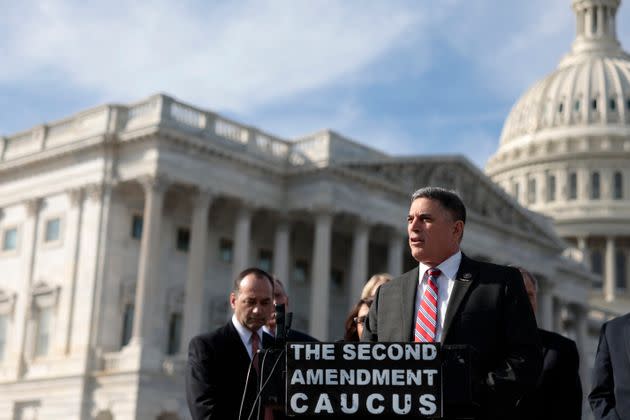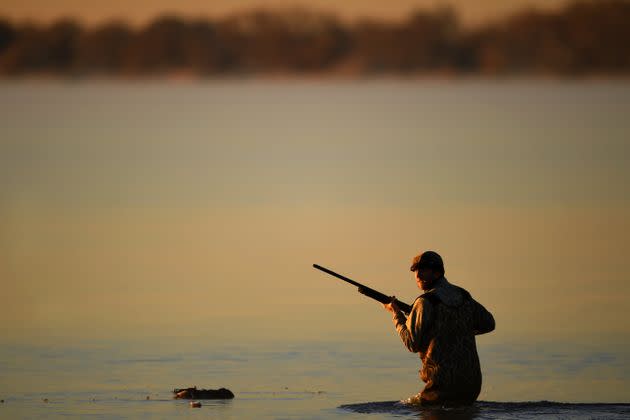GOP Gun Bill Loses Support Amid Outrage From Hunting, Conservation Groups
- Oops!Something went wrong.Please try again later.
- Oops!Something went wrong.Please try again later.
Seven House Republicans have withdrawn as co-sponsors of a bill that aims to repeal an excise tax on firearms and ammunition which for decades has served as a financial pillar of the American model of wildlife conservation.
“Sometimes you look at a bill and, you know, it’s explained to be a positive and you look at it a little bit further and you change your mind,” Rep. Glenn Grothman (R-Wis.) told HuffPost about his decision to un-sponsor the legislation.
The legislation, dubbed the RETURN Act (Repealing Excise Tax on Unalienable Rights Now) was introduced in June by Rep. Andrew Clyde (R-Ga.) and dozens of other House Republicans. It takes aim at a tax that gun and ammunition manufacturers and importers have paid for more than a century. Since the passage of the bipartisan Pittman-Robertson Act in 1937, money collected through the tax — 11% on long guns, ammunition and archery equipment; 10% on handguns — has been distributed to states to pay for wildlife management and research, habitat conservation, land acquisition and hunter education.
Despite that long history and the popularity of the Pittman-Robertson Act among hunters, anglers, conservationists and the firearm industry, Clyde and other sponsors have painted the tax as an assault on the Second Amendment.
In a statement announcing his bill, Clyde, who owns a firearm store in Georgia, argued “no American should be taxed on their enumerated rights.” Eliminating the excise tax, he said, would “stop the Left’s tyranny in its tracks.” (Aside from the fact that the legislation redirecting the tax was passed more than 80 years ago, the Robertson in the bill’s title was Absalom Willis Robertson, a conservative opponent of civil rights who was also the father of televangelist Pat Robertson.)
Rep. Elise Stefanik (R-N.Y.), another co-sponsor and chair of the House Republican Conference, claimed the tax “infringes on Americans’ ability to exercise their Second Amendment rights and creates a dangerous opportunity for the government to weaponize taxation to price this unalienable right out of reach for most Americans.”

Rep. Andrew Clyde (R-Ga.) speaks at a March 8 news conference alongside members of the Second Amendment Caucus at the U.S. Capitol. When Clyde introduced the excise tax repeal bill, he characterized the tax as a leftist assault on Second Amendment rights. (Photo: Anna Moneymaker via Getty Images)
In pushing the limits of pro-gun, anti-tax politics, Clyde and his allies sparked a firestorm within the hunting, shooting sports and conservation communities. Several organizations were quick to condemn the bill and its sponsors. Delta Waterfowl Foundation circulated a petition that called Clyde’s bill “a clear threat to the well-established, highly popular ‘North American Model of Wildlife Conservation’ which is widely recognized as the most successful wildlife conservation framework in the world.”
As the campaign to kill the legislation grew, the number of sponsors began to shrink. After reaching 58 sponsors in Jule, the bill is down to 51. As of Monday, seven Republicans, including two of Clyde’s colleagues in the Georgia congressional delegation, had withdrawn their support: Reps. John Rutherford (Fla.), Markwayne Mullin (Okla.), Austin Scott (Ga.), Earl “Buddy” Carter (Ga.), Scott DesJarlais (R-Tenn.), Trent Kelly (R-Miss) and Grothman.
The bill now has three fewer sponsors than it did when it was introduced in late June.
Grothman told HuffPost it became clear people were concerned that the bill would lead to a gap in conservation dollars and said he decided against supporting the bill even though he didn’t think it would actually defund the Pittman-Robertson Act.
“There’s no reason to get involved in a debate on that bill at this time,” Grothman said. “I decided, ‘Why open that can of worms?’”
The bill never stood much chance of passing. Still, it’s probably more common for a messaging bill to gain sponsors over time, not lose them.
“This is how democracy is supposed to work,” said Land Tawney, president and CEO of Montana-based Backcountry Hunters & Anglers. “When ill-fated ideas are presented, the people respond, and in this case they resoundingly said no. That’s why this bill is going nowhere. Rep. Clyde should heed the actions of his colleagues and pull this misguided legislation altogether.”

Tim Brass, state policy and field operations director with Colorado Backcountry Hunters and Anglers, hunts ducks at Colorado's Jackson Lake State Park in November 2018. (Photo: Joe Amon/The Denver Post via Getty Images)
Clyde’s office has continued to defend the proposal, saying it would simply change the funding structure of Pittman-Robertson programs. The legislation would reallocate a maximum $800 million in revenues from energy development on federal lands and waters to make up for lost funding from the gun tax.
But $800 million is a little more than half of the $1.5 billion that the Interior Department is set to distribute to state wildlife agencies this year through the Pittman-Robertson Act and its fisheries equivalent, the Dingell-Johnson Sport Fish Restoration Act, in 2022. To date, the programs have divvied up a combined $25.5 billion for conservation and outdoor recreation projects.
Asked about the GOP members dropping their support, Madeline Huffman, a spokesperson for Clyde, said that “it’s unfortunate that numerous media outlets and conservation groups have spread misinformation” about the bill.
“The Congressman is incredibly proud and thankful to have a quarter of the House Republican Conference supporting his legislation, and he will not be deterred by misinformation or nefarious intentions in his pursuit to both protect Americans’ Second Amendment rights and fully preserve Pittman-Robertson,” she said via email.
Though it is clear that many of the bill’s sponsors have fielded angry calls and letters from constituents, few have taken as much heat as Rep. Matt Rosendale (R-Mont.). More than a dozen hunting, fishing, angling and conservation groups in his home state signed on to a letter urging the at-large congressman to rescind his support, The Daily Montanan reported.
Rosendale is still backing the bill. And during a recent telephone town hall, he reportedly called the measure a “win-win” and said it has his support because it would reduce the cost of guns and ammo.
Again, the tax is paid by manufacturers and importers, not consumers. And though Rosendale and others are touting potential trickle-down savings for gun owners, they’ve threatened to upend a decades-old framework for bankrolling conservation across the country.
In May, well before the bill’s introduction, a group of more than 40 hunting, outdoor recreation and gun advocacy organizations sent a letter to Senate and House leaders warning against any change in the status quo.
“We are united in our shared support for the current ‘user pays-public benefits’ system of wildlife funding,” says the letter, which includes signatures from the National Shooting Sports Foundation, Ducks Unlimited and the Boone and Crockett Club. “Among other things, generating all Pittman-Robertson funding from alternative sources would negatively impact our community’s unique relationship with state fish and wildlife agencies. Without the financial contributions of sportsmen and women and sporting manufacturers, the seat held at the decision-making table for hunters and recreational shooters may be lost.”
This article originally appeared on HuffPost and has been updated.
